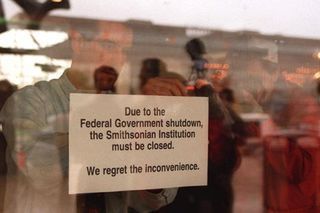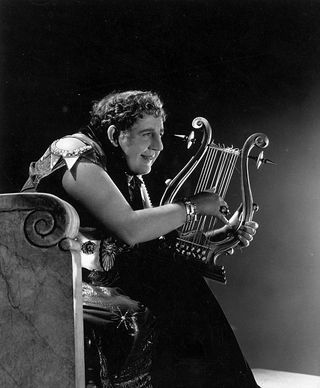Mary Beard's Blog, page 67
April 29, 2011
Royal wedding: ten questions
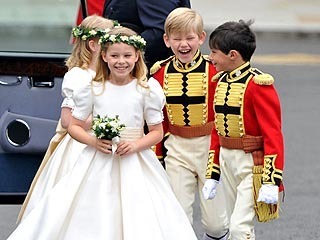
I am writing this from Heathrow, on the way back the Washington to give my 5th Mellon lecture on Sunday. I did take a peek at a bit of the wedding coverage before I left. Let me say straight away:
If these are two young people wanting to tie the knot, then I wish them all the best.. and what follows is not mean to be mean spirited or churlish. Good luck to them.
And anyway thanks to them, I got to Heathrow in record time (1 hour and 10 minutes from Cambridge... as against close to 2 hours).
All the same... there are some of the puzzles I am left with after the tv nuptials
1) How come the great and the good of this country don't appear to know the words of "Jerusalem" without looking at their hymn sheets, and even then dont seem to be quite certain of how the words fit the tune..?
2) Who WERE the two grey nuns sitting next to the bride and groom right up at the chancel end of the Abbey?
3) Did anyone advise William that (as the daughter pointed out) the red uniform made a TERRIBLE match for his complexion on telly, at least. (More on silly uniforms below)
4) What were the ex-royals doing there, as if they had never lost their thrones? The king of Yugoslavia? Of Greece (didnt actually spot him, but I THINK he was on the guest list)? I can just about get my head around kings and queens, but not ones that have been thrown out. ("No king without a country" would be my rule for such aoccasion, and then you might be able to find a pew for Blair and Brown?)
5) Can the Church of England really go on with this terrible sexism? Good on her, Kate didn't promise tp obey ( I seem to remember that Fergie did.. am I wrong?). But there is still that terrible stuff about "what man gives away this woman..?'
6) Did Harry actually look a bit uncomfortable when the lovely Pippa put his arm into his? Twitter is full of the new romance, but I thought Harry was a slightly embarrassed "real gent" ...
7) What WERE those collars on the Ruritanian uniforms worn by the main players? (The husband calls them "Gaddaffi Costumes"?). Are they concealing braces.. in Prince Philip's case, maybe they are. (And why were even the page-boys in para military uniforms?)
8) Why did Cameron bottle out and not just turn up 'normal'; it pains me to say it, but Sam Cam looked about the best of the whole congregation -- and YIPPEE no hat.
9) How many of the people we saw on the front rows were actually plain clothed police... with machine guns under their frocks, and a special budget for hats to 'blend in'? Like the hatted woman in the front of the car taking Kate and Dad to the Abbey.
10) Quite how many of the audience (aka congregation) were from British ethnic minority communities?? Sure there were a range of foreign ambassadors and "heads of state" who were not white and blonde.. but of the rest?? I have just done a "conversation" with David Lammy in the Guardian about access to Oxbridge (should appear on Saturday: be kind) ... but looking at this, I though that "access to the Abbey" was a pressing issue too.
Maybe my puzzlement is partly my error. I chose to watch on BBC 1 on my laptop, but Ed Stourton on Radio 4 would no doubt have answered these questions.. especially the nuns. All further answers gratefully received.
April 28, 2011
I have just voted "no" (sorry)
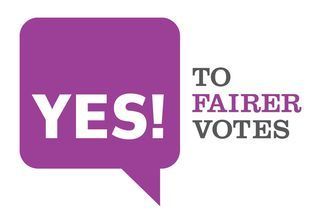
In the 'fairer votes referendum', that is. I have done this by post and with a heavy heart.
For this election (unusually) we have had a load of stuff through the door, and each side had such bad arguments (as well, to be fair, the occasional good ones) that all I could do was:
a) not vote at all (and so let my mum down who thought that any woman who didn't vote was ratting on the whole of woman kind)
b) vote no, for the status quo (ie a sort of abstention)
I suppose I could also have spoiled the ballot paper, but I hadn't really considered that option before the postal ballot went in the post box.
I suppose I should be a natural for a change in the system - and the 'no campaign' had some truly repulsive and quite misleading arguments. But the argument for change has got to be more powerful to get me behind it.
The thing that tipped the balance was the last piece of paper that came from "yestofairervotes".
It gave me three reasons to vote "yes".
First: It will make all MPs work harder.
Well, I think that MPs DO already work very hard. It's not hard work that's their problem... it's what they work hard DOING.
Second: It will make your vote count.
I see the point here. But there are more aspects to this. One of the good points made by the No campaign (among the layers of dross) was the effect of a "coalition culture" on what you think you are voting for. If parties are almost bound eventually to cut their cloth to get into a coalition agreement, then what reliance can we place on the policies of their manifesto.. in other words how do we know what we're voting for. (We've already seen that with the Liberal Democrats and student tuition fees.)
Third: It will tackle the 'jobs for life culture' (aka 'safe seats').
I am not certain on this that I DO think safe seats are so bad. It's easy to knock those seats where anything with either a blue or a red rosette will get in ... but in fact I can see quite a lot to be said for continuity of representation and the development of a strong bond between member and constituency.
The same piece of paper also told me that if I voted no (as I just have), I would be voting for my "voice not being heard, MPs in the dock, expenses scandal'. At this point I had that sinking feeling that this campaign for a change in voting system was promising itself as the answer to political ills that it couldnt possibly cure.. and I decided to stick with the devil I knew.
In the hope perhaps that one day a more realistic, clear headed, more coherently supported system of 'fairer votes' might come our way.
April 26, 2011
The wedding: my hypocrisy

On "THE DAY", I shall be flying back to DC for my fifth Mellon lecture (do come, one and all... please don't lose the habit after the spring break!). So I don't have to fuss too much about whether I will watch it, still less whether I will whoop it up at a street party (well, a street party in Huntingdon Road would bring a frisson of risk, speed cameras notwithstanding).
The truth is though that the wedding brings out the hypocrites in us all.
If you asked me straight whether I thought the monarchy had had its day, I would have to say yes. It matters not whether the Queen is a hardworking woman (I am sure she is)... or, conversely, whether Prince Charles has his tooth brush "pasted" by his man-servant (I really hope that that is NOT true). Whatever, the fact is that the monarchy costs a very great deal, legitimates a class structure and aristocracy that we would be much better off without (just think how the Dukes and Earls would tumble if Her Majesty was relocated to a small semi), and is an insult to all the hardworking and struggling people in this country, who would be happy with 1/1000th of the space that the royals occupy.
But all that is easy to say, harder to live.
It is also the case that if I got an invitation to the palace I would go like a shot (no doubt cancelling other things). In fact, when the husband was invited to a Garden Party, I found myself dead keen and in quite a fret about the frock and the hat. And if I had been invited to THE wedding, well... yes, I would have said yes without a murmur.
So until we Republicans can be strong enough not to be glitzed by royalty, I fear we will always remain in its thrall... and to be 'anti-monarchy" will be for most of us an armchair occupation (as we wait, dream on (!), for that gold rimmed invitation to drop through the letter box).
As it happens I am not leavig for the USA till early evening on Friday. And I just fancy I might turn the tv on, albeit briefly.
Oh and thats my finger with the daughter's Primark ring, a bargain at £2.00 and a great hit in the USA. A nice match for my "DONT DO IT DI" badge from back in 1981.
April 20, 2011
Will I get to meet Bob Dylan?

I am feeling chuffed beyond imagining to have been elected an Honorary Member of the American Academy of Arts and Sciences. I was enormously pleased a year ago to have been made a fellow of the British Academy .. but then there had been a prior, and very discreet, request for a cv, so I knew that something was going on (even if, as all communications made clear, it would come to nothing).
This came right out of the blue. In fact I had the first congratulation before I had got the letter, and that is always the best. Not to mention the fact of my real warmth to the Academy that they did not hold some of my past crimes against me.. if ever there was a case for blazoning the community of scholarship, the welcoming of lost sheep, the broad church of democratic freedoms of speech, and the virtues of "live and let live" then this is it. For which I am truly grateful and touched and honoured. (Those of you who dont know what on earth I am going on about, click here.)
But I got even more excited when I looked at the other electees.
It is funny how different countries have different boundaries when it comes to cultural amd academic honours. In the UK science and humanities and divided, and I dont think that either the Royal Society or the British Academy recognise the performing arts etc, as part of their remit.
Anyway, when I looked at the other people who had just been elected like me -- I was, well, star struck. Yes, there is my friend Brian Rose (congratulations Brian, if you read this). But look who else. I guess that the "Bob Dylan" of Malibu must be the guy I think it is, and then there is Leonard Cohen (who has taken me round the world with Hallelujah - a British Airways favourite on their soundtrack -- not to mention the teenage years).. and to cap it all there is Paul Simon.
Do you think that when I go to sign in in October I will meet these guys. If so, so much the better for being an academic. (OK, realistically I wont, but dream on Beard.)
And excellent as the British Academy is, do we think that it might be enhamced by the presence of Mick Jagger? There's a thought, guys.
April 19, 2011
The Museum of London. A glimmer of hope?

Since my last post on the subject, I've gone on being worried about the Museum of London. And there was a powerful piece this week in SALON (the really excellent e-magazine that goes out to Fellows of the Society of Antiquaries).
The redundancies are now out in the open, and basically there are cuts...and the posts of Roman and Prehistoric senior curator are being combined (and in my book those are rather different specialisms). But the question is whether this new curator will actually be appointed. As SALON reports, so far not. And that leaves anything before "modern" in the Museum without a senior scholar.
This is what SALON had to say:
"Now, following the issue of final redundancy notices on 12 April 2011, the facts have become clear. The prehistoric and Roman posts are being combined into a single Senior Curator (Prehistoric and Roman) post. However, this post has not been filled. The existing Senior Curator (Prehistoric) and Senior Curator (Roman) are both being made redundant. The post of Senior Curator (Medieval) . . . . is being combined with that of the existing Senior Curator (Post-Medieval). So, from four Senior Curators and two Curators in 2009, the number of staff responsible for the Museum's pre-1700 collections is now being reduced to two Senior Curators and two Curators, with one of the Senior posts unfilled."
Anyway, as the top brass of the Museum had been very civil to me after my first outburst, I thought I should say that I was going to blog on the subject 'again. And they did give a bit of a more upbeat report.
"The Museum is starting the recruitment for the new Senior Curator Prehistory and Roman London now, and hopes to add more Curator posts to the new structure in the future, as finances allow."
I haven't stopped being anxious about this (the phrase, "as finances allow" tends to mean "never", and somehow the combination of Roman with the Bronze Age doesnt inspire confidence). But let's hope that there IS soon a new Senior Curator (much needed to replace scholars who really did know a lot).
Meanwhile the world that museums now have to operate in makes one gloomy. It's not just that the atmosphere in the MOL recently has been pretty edgy (and not especially conducive, I imagine, to top rank research on London's history). It was a bit depressing to see the advert put out by the Mayor of London's office for a new governor of the Museum.
This was the key bit of the job description:
"You should have a keen interest in the Museum and the ability to contribute to future policy, together with experience and understanding of strategic decision-making and the principles of corporate governance in the public sector. Excellent communication and advocacy skills are essential and you will have no trouble commanding respect amongst key stakeholders at all levels.
We would welcome applications from those with strong business and entrepreneurial skills and a track record in running a commercial business, and from individuals who have experience of making a difference to successful charitable fundraising initiatives. Lastly, all applicants should have a good understanding of London and its diverse communities with a commitment to promoting diversity."
Nothing there about actually KNOWING something about the history of London.
April 17, 2011
Howler averted
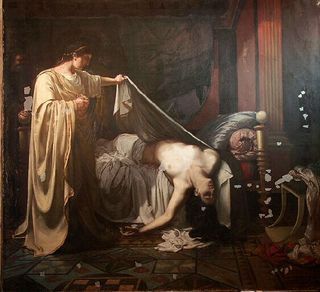
It's a good principle not to build any argument on a work of art you havent seen. That's for the obvious reason that when you actually look a painting, or a sculpture, or an object you find out something crucial about it that you won't have spotted from a photograph; nine times out of ten. Sometimes it's as simple as a matter of size. I know that good books will note the dimensions of a painting... but even so it is hard to take in until you see it. It took me years to understand that many of Alma Tadema's nudes were not great big pin-up but small scale things (for the study rather than the hall).
Anyway, that's the principle but it isnt always possible in practice.
This week, I've been preparing my fourth Mellon lecture, on representations of the female members of the Roman imperial court, and I have found myself focussing on the Agrippinas.One of the scenes I have been collecting is a favourite of later painters -- Nero inspecting the body of the dead Agrippina.
And thanks to the wonderful French database, Joconde, I came across the painting at the top of this post ... a great 19th century view by Eugene Appert (no I hadnt heard of him either).
 It is rather more tender than some of the seventeenth century images that I had collected (like the Zanchi here), and I found myself intrigued by the little bits of white paper drifting across the scene.
It is rather more tender than some of the seventeenth century images that I had collected (like the Zanchi here), and I found myself intrigued by the little bits of white paper drifting across the scene.
What was this a reference to. A torn up letter between mother and son? Again there seemed to be a romantic tenderness about that idea. But where had Appert got it from? There was no mention of that in any ancient source I knew. But then there was no mention of Nero dissecting his mother's corpse either... and that is what the Middle Ages go big on.
I was beginning to get very interested.
It wasnt until I tried it out on the big screen that I realised (what you may have guessed already) that it wasn't a torn up letter at all...but some fault on the digi image.
Phew.. at least I hadnt built it into the argument of the lecture. A lucky escape, but a very nice illustration of the basic Beard principle.
April 12, 2011
Architectural pilgrims
In the main concourse of the East Building of the National Gallery in DC, where I am based,is a plaque put up commemorating the foundation of the new wing, donors, builders, architects etc. It's perfectly standard stuff, except the name of I. M. Pei is practically blacked out -- thanks to the numbers of hot, dirty, sweaty hands that, since 1978, have dared to touch the holy spot where his name is carved.
What is it that makes someone treat an architect as a saint? Does this happen for others? Or has Pei got some special charisma that the rest dont have?
DC turns out to have a lot of celebrity architecture about. Some of it uncannily reminiscent of the work of the same celebrity architects' work elsewhere.
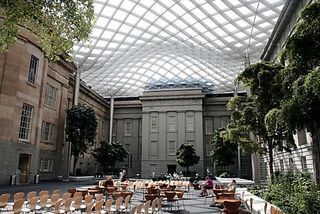
There is a Foster roofed-over court at the National Portrait Gallery that is a dead ringer for the British Museum Great Court, and just a few years later.  (Do click on the Foster website: it is a cliche of the genre "we design by challenging -- by asking the right questions" . Pity you didnt think about where to leave your bike at the Law Faculty in Cambridge, I found myself thinking. Any modern building in Cambridge that needs scores of notices on it saying 'please do not park your bike here' has certainly not asked the right questions!)
(Do click on the Foster website: it is a cliche of the genre "we design by challenging -- by asking the right questions" . Pity you didnt think about where to leave your bike at the Law Faculty in Cambridge, I found myself thinking. Any modern building in Cambridge that needs scores of notices on it saying 'please do not park your bike here' has certainly not asked the right questions!)
And Pei was obviously already in the 1970s having a trial run on his Louvre pyramids  at the NGA.
at the NGA.
I suppose I shouldnt be surprised. I mean Christopher Wren did much the same, and you can spot Frank Lloyd Wright's tricks a mile off. And I think that the Pei building in Washington is one of the most stunning buildings I've ever worked in (and I guess before I go, I'll be joining the pilgrims).
But you cant help being a bit surprised that he hasn't got a wider range of tricks up his sleeve.
April 9, 2011
Shut down and shut up?
Yesterday was an edgy day.
My Mellon lectures are held in the National Gallery (which is a Federal Institution) and I am, I guess, under contract to the US Federal Government . . . what is more, my temporary email address ends ".gov" (no doubt about as close to the heart of the US political system as I'll ever get).
That all meant that if there was a Federal shutdown, there would be no lecture on Sunday. The National Gallery would be shut and I would not be allowed simply to give it in an alternative venue.
I can't tell you how hard it is to write a lecture that you dont know you will be able to deliver. There is something about the adrenalin (aka sheer terror) of facing the audience that concentrates the mind (which is, I guess, one of the reasons why it always seem much easier to write a lecture than a book... even fierce letters from the publisher aren't as pressing that a few hundred faces).
Knowing that it was definitely off would have been better I think. But looking at the Capitol all day wondering if white smoke was about to appear and if a budget resolution had been passed so te lecture could go ahead was increasingly distracting. I found myself with the Washington Post open on my desktop and every 20 minutes or so I would click on "Federal Shutdown" in Google News.
Google News revealed that there were thousands of people facing the shutdown with concerns about as selfish as my own. Never mind the thousands who would be going without pay, or passports or social security cheques . . . the headlines all seemed to be along the lines of: "Federal shutdown may hurt local housing market" or "What does a Federal Shutdown mean for Hampton Roads?" or "What about my tax return" (... "will Federal Shutdown stop my Mellon lectures?" would have fitted in nicely).
Anyway by the time I had finished the powerpoint and given it a run through, we still didnt know. So, with the help of Sarah's car (THANK YOU), I checked some books out of the library and brought them home in case I had to prepare the next lecture outside the office (surely they would be given EVENTUALLY I reckoned... couldnt just call it a day!). And then I went to drown my anxiety in a large quantities of food and alcohol with a friend who had come from California to hear a lecture that might not be given.
By the time we toddled back, just coming up to midnight, the email came that ALL WAS ON.
So, hooray. Hope to see some of you on Sunday.
Now I just have to take all those books back to the library.
April 5, 2011
Work inexperience: the Clegg plan
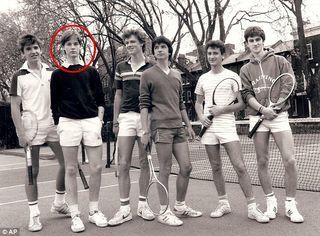
When I got round to reading the coalition's new social mobility strategy, it was a relief to discover that it was not as bad as Nick Clegg's fronting of it. You can tell where he comes from when you read him thundering on about internships being fixed up at the golf club or tennis club -- or complaining about social opportunity being determined by "who your father's friends are". What has happened to influential mothers in Clegg's world I wondered? And if only the problem was restricted to the tiny proportion of the UK population who belong to a golf club or tennis club . . . but, hang on, isnt the government supposed to be supporting these sports??. (It's the young Clegg above by the way, in the picture.)
The Cabinet Office document itself wasn't quite so silly, and was oozing with New Tory good intentions. But it was also loaded with problems and contradictions.
First: the definition of social mobility.This turn out to be a wonderful sort of movement, as it is in one direction only: that is upwards. In fact, so it is defined in Chapter One: "Social mobility is a measure of how free people are to improve their position in society." (my italics) And all the graphs and data track only the percentage of people who do BETTER than where they started out.
Nice try, but mobility (especially in a recession) means people going down as well as up. In fact, may be the reason we have been so bad at achieving the upward sort, is precisely because we have thought about it as uni-directional. So lets have some data please on the downwardly mobile too, and wonder about how we should manage that -- and indeed wonder about what being downwardly mobile actually means. (I think this is what D. Willetts was trying to get at when he got rounded on last week by many of my friends: social reforms have victims as well as beneficiaries).
Then there are those damn internships.
The real contradiction here was between the villainy of the middle class dads who try to get their kids a leg up in the world and the way the first chapters of the Cabinet Office paper was all for parental investment in the childs progress in the early years. It seemed that the coalition's idea is that Dads should be positively encouraged to learn nappy-changing and more advanced parenting skill with the under 5s... but back off the help for little Johnny or Jessica later when it comes to getting them a job. How likely is that?
But maybe we shouldnt worry too much. The whole document was based on the idea that internships and work experience were a real leg up in the world of work. Perhaps they are for some; but for most people I suspect they are a dead end of being given mindless, invented jobs by people who simply cannot think of some interesting and useful task that the twentieth untrained intern they have seen that year can possibly be set to do. And try talking to any teacher about setting up work (in)experience schemes -- as required by al sorts of government initiatives -- for the nation's 16 year olds.
If I was going to do someting (upward) social mobility for the disadvataged, frankly I would leave the internships to the golf club crowds and concentrate on the GCSEs.
April 1, 2011
The Haldane Principle -- and the next Mellon lecture
My colleague Peter Mandler was absolutely right last week to point to the erosion of the "Haldane principle" and the creeping idea that academic research should work to the government's objectives (would we have had Leonardo, Darwin, Freud, Einstein . . . if they had been made to toe the government's strategic line?)
The particularly offensive thing was that one of the new research priorities was to be reserach into the Big Society. How come a half-baked electoral slogan becomes an AHRC research priority?
The facts are all a bit murky here. Where did the pressure come from? It looks like from the government. But the AHRC deny categorically that they were coerced into supporting this bit of government blather. And even some government spokespeople say that the idea of putting reserach into the Big Society as a priority actually came from the AHRC.
I began to speculate that this was a clever idea from the AHRC (even if one that has back-fired). Imagine you were running the AHRC and Willetts and co want some research objectives. Wouldn't it seem a great wheeze to suggest the Big Society. After all the whole idea is so vacuous (and capacious) that anything you like would fit in (so business as usual) -- and the government couldn't possibly say no to it, because it is THEIR idea.
Well maybe; but I still cant help thinking that the principle of no government intervention in research priorities was the right one, that anything else is truly disastrous and that this might just have sold us all down the river.
Meanwhile I have just finished my powerpoint for Sunday's lecture. Two and a half days it took this time (with a lot of help.. thanks Laura and Mattie).. so I hope you enjoy it. Some stop press news
1) there will be an extra room this Sunday, so -- all being well -- noone should be turned away.
2) I fear that the movies have got a little squeezed out. I SHALL be returning to them, but I found that I really needed to get into tapestries this week. So if you were only coming for the movies, pleased be warned. In fact I had a great still from Sign of the Cross that I was going to use nonetheless. And then I went and forgot to include it . And I am NOT changing the damn ppt now, as it is all installed on the auditirum system. So it is fo rthe time being at the top of this post.
Hope to see some of you Sunday.
(Great list of movies David Thompson in your comment to my last . . .)
Mary Beard's Blog
- Mary Beard's profile
- 4112 followers



